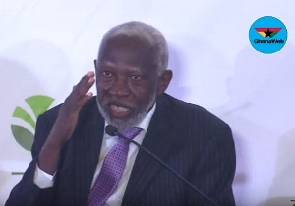 Professor Stephen Adei, Chairman, NDPC
Professor Stephen Adei, Chairman, NDPC
Professor Stephen Adei, Chairman, National Development Planning Commission (NDPC), has launched the Adansi-Asokwa Medium-term Development Plan and Structure Plan Preparation as a model for other district assemblies.
“This has become necessary because we believe things can be done differently," Prof Adei stated at the launch of the development plan at Asokwa, the District Capital of Adansi-Asokwa in the Asante Region.
"We live in an era, where Medium-Term Development Plans that addresses socio-economic development issues are well prepared for implementation, however, the spatial dimension that prescribes location of residents in relation to schools, recreation, retail, commercial and industrial activities are often relegated to the background."
Prof. Adei said the neglect of spatial planning by Assemblies would “certainly have enormous consequences for the environment.”
He said notably among the concerns were; unauthorized and uncontrolled development, flooding, poor sanitation, health hazards, fire hazards, crime and squatter settlements.
Prof Adei said out of 260 Metropolitan, Municipal and District Assemblies, only eight had prepared their structure plan according to the 2019 Annual Progress Report.
"You can, therefore, imagine why most of our urban centres are being containerized with little development control," he said.
"Structure plan is a highly regarded and long established planning tool that sets out a vision for the future development of a district or locality over the next 10-20 years.
“It incorporates the planning and management framework required to guide development and land-use changes that will achieve sustainable environmental, social and economic objectives.”
Adansi Asokwa is a newly created District, carved out from Adansi North in 2018.
The preparation of structure plan for the District, for the first time, places the Assembly in an ideal position to exercise greater control on current and future development of the area.
It will help the District to properly express its social and economic aspirations in space.
Prof. Adei said the structure plan would include; a promotional video that would capture the spatial development aspirations of the people; highlight the economic, social and cultural potentials of the area.
He said it would serve as an investment promotional tool for officials of the Assembly.
Prof. Adei said the implementation of the structure plan would span a 15-year horizon; adding that, therefore, the combination of Medium-term Development Plan with the Structure Plan was to allow for the first five years of the District Structure Plan to be incorporated into the Medium-term Development Plan to guide implementation.
He said, however, the structure plan must be reviewed every five years to account for the changing local, national and international environment.
Prof. Adei said relevant partnerships had been established with Land Use and Spatial Planning Authority and the Centre for Remote Sensing and Geographic Information Services to demonstrate the collaborative nature of planning and to also realise the objective of making Adansi Asokwa a Model District.
“By becoming a Model District, I challenge you to have the best of well laid out land use and spatial plans, clean and healthy environment and address effectively, the socio-economic issues confronting the district. I have no doubt that the Assembly will excel in this endeavour” he said.
Prof Adei said the Commission stood ready to deepen its advisory services to Regional Administrations and Metropolitan, Municipal and District Assemblies (MMDAs).
Madam Eunice Korankye, Coordinating Director, Adansi-Asokwa District, said the District was privileged to have been considered such an important project, which would lead to the completion of Ghana infrastructure plan (2013-2047).
She, therefore, expressed gratitude to the NDPC for the foresight.